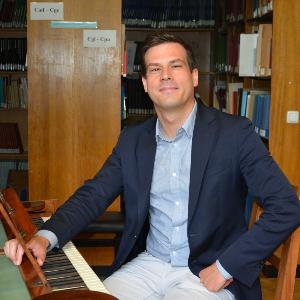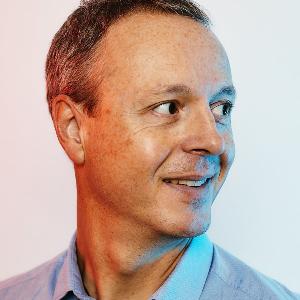All aboard for the new semester!
12 Apr 2021
Excavations on the kitchen table and walks in the open air: How students and teachers have coped with the new normal during the last two semesters.
12 Apr 2021
Excavations on the kitchen table and walks in the open air: How students and teachers have coped with the new normal during the last two semesters.
In addition to a good Internet connection, the last two semesters have demanded lots of creativity from both students and their teachers. Here they tell us about the ideas they have come up with, what they learned from them, and what they look forward to in the coming months.

© LMU
Jan Golch is a member of the academic staff of the Institute of Musicology.
When did we last spend so much time thinking so deeply and extensively about university teaching? I believe that all that effort has paid off! Much of the digital material have introduced will certainly remain useful long after the restrictions imposed by the coronavirus pandemic have been lifted. Things like my "MuWitutorials" – a little video series on how to approach the study of musicology – will become a regular component of the curriculum. And our musical aptitude test for prospective students will take place online in future.
In addition, much of what we have learned from our experiences of digital tuition is readily translatable to the lecture hall. In online sessions, the lecturer's role as motivator and moderator is much more important. One has to pause more often, be patient, wait for responses and give discussions more time to get going. These lessons can only improve our 'live performances', just as the use of a single platform simplifies the use of different media – in my case, audio tracks, scores and texts.
Despite its advantages, digital tuition has underlined the vital role of universities as institutions in which curiosity, open-mindedness, face-to-face encounters, arguments and counterarguments are indispensable, Our student days are not just a section of our CVs, they are a specific stage in our lives.Jan Golch
One thing that unfortunately cannot be transferred to the lecture hall is the flexibility of digital platforms. To give just one example, In the Winter Semester, we had three students from Munich, Vienna and Augsburg who logged into my online seminar on Robert Schumann as trial students. They enjoyed the seminar so much that they stayed with it for the rest of the semester. I thought that was wonderful!
I'm excited about the coming months. Despite its advantages, digital tuition has shown how important universities are as institutions, in which curiosity, open-mindedness, face-to-face encounters, arguments and counter-arguments are indispensable. One's student years are not just a segment in one's CV, they are a specific stage in one's life. I would be very happy to see students return to the lecture hall with a greater appreciation of that fact.“

©
Julia Budka is Professor of Egyptian Archeology and Egyptian Art History.
In comparison with the last two semesters, the new Corona semester promises to be easier to handle. Most of us have already become adept at Moodling, and are now accustomed to a combination of Moodle courses and online tuition via Zoom. I have found working in groups, the use of breakout rooms and combinations of media very useful – teaching and learning online all week and every week is very tiring for both sides. Offline reading assignments, videos and group discussions introduce a bit more variety into the program.
The pandemic has not only affected teaching, it has also had repercussions for research. In the absence of opportunities to carry out research in the field in Egypt and Sudan, I have been forced to become more flexible and I have had to reconfigure the planning of my projects. During the Winter Semester, I was able to combine these new challenges with my teaching duties very satisfactorily.
We can hardly wait to resume fieldwork.Julia Budka
We had planned to give a practical class in excavation, which was designed to serve as an introduction to all elements of archeological fieldwork. But in the end, rising case numbers meant that the course had to be given as an online practical. And although it required intensive preparation, it worked astonishingly well – thanks to the use of short videos and handouts via Moodle and Zoom, and the creative ideas produced by my colleagues, such as 'excavations on the kitchen table'. This novel concept enabled us to demonstrate the basics of stratigraphic excavation not only by digging through, but by eating through successive layers!
More importantly, we were able to send the three teams that took part in the practical into the field – with the aid of remote sensing, the only option available to us at present, The teams were provided with aerial photographs of the area covered by my excavation permit in Sudan, and each group had a whole afternoon to inspect them, to map everything of any relevance and then present their results to the whole class.
The results submitted by all three teams were very impressive, and they made one thing crystal clear: We can hardly wait to get back into the field, with these students or with others with the same passion for archeology. In the meantime, and in spite of all the difficulties, we have shown that some important aspects of the practice of archeology can be taught without direct access to field sites.
Prof. Budka's students have recorded their experiences during the online excavation practical in a Blog.

LMU student Gözde Çelik is a member of the editorial team of the student magazine philtrat.
Under the present conditions, there's no way we can produce a print edition. That was the first thing we realized and accepted. Our team is made up of volunteers, and the money we take in from sales of the magazine is used exclusively to cover the costs of the next issue. So it was clear that there was no point in producing a new issue for which we had no customers. Who could we have sold it to, when there is nobody on campus? The next question was: What do we do now?
At a time when remote learning is the only option, it is even more important than before that we don't lose contact with one another, and have some other means of staying in touch than just attending online lectures. In this context, the important point was that we already had an online team and that philtrat was not only accessible in print. So we not only had the infrastructure, we had a platform on which we could continue to be active as journalists.
At a time when remote learning is the only option, it's more important than ever not to lose contact with one another, and to have some other means of staying in touch than just attending online lectures.Gözde Çelik
The first online semester was anything but a smooth ride. Print and online editions had to be integrated, which required more internal communication, and difficulties owing to the lack of personal contact had to be addressed in other ways. This meant that the editorial staff of the online edition had to be enlarged. Regular meetings, Zoom sessions and evenings devoted to online gaming were introduced in place of face-to-face meetings.
Of course, it's not the same. We all realize that. But it allows us to work together on a project, and that's what we really enjoy. It's a new experience for us all, we can try things out, and we can provide a platform for topics of interest to students at the same time.

© Conny Mirbach
Andreas Butz holds the Chair of Human-Machine Interaction and is Dean of Studies at the Institute of Informatics
When the coronavirus hit us a year ago, many university teachers reacted to the prospect of digital tuition like the proverbial rabbit confronted by a snake. But teaching staff and students in Informatics and Media Science soon adapted to the change, and we were able to ease the transition for our colleagues in other faculties by providing them with a short technical guide to the technology.
Nevertheless, we all had to learn how to communicate with one another via digital media, instead of face-to-face in the lecture hall. At first, when the lecturer put a question to the class during a Zoom session, the silence that emanated from hundreds of little gray boxes was deafening!
When the second online semester began we were all more familiar with the routine. Students were less likely to turn their cameras off, and teachers now made more effective use of the the medium. Discussions were moved to breakout rooms, which allowed small groups to get to grips with the issues, or they were shifted to e-learning models like Flipped Classroom. What pleased me most was observing how we as educators effectively became learners again, as we had to relearn the basic elements of our craft.
What pleased me most was observing how we as educators effectively became learners again, as we had to relearn the basic elements of our craft.Andreas Butz
However, examinations remain one of the biggest problems in the realm of digital education. Finding ways to ensure that they are fair, secure, demanding and feasible for classes of more than 1000 students is a far greater challenge than teaching courses via digital media.
As we embark on our third digital semester, we are no longer terrified by the prospect. One could almost describe us as "old hands" in the digital classroom. We can fall back on the digital material we put together last year, which gives us more time to devote to the remaining problems - in particular those relating to exams. We have all learned a lot in the past year, and I'm certain that, when we eventually return to face-to-face teaching, our approach will be enhanced by many of the digital elements we have incorporated into our courses in the meantime.

Sophie Appl is a psychologist who works for LMU's Intercultural Advisory Service, and the initiator of the "Walking Buddies" project.
In our contacts with international students, we became aware of a growing sense of loneliness and psychological stress. When restrictions to combat the coronavirus were introduced, many of our charges were alarmed and seldom went out at all. That's why we started the "Walking Buddies" project and paired up our students online, so that they could go out together for walks in parks in Munich and surrounding areas.
Encouraging our students to go out more and get some exercise in the open air improved their wellbeing, and pairing them up provided each of them with a valuable day-to-day contact. We got lots of e-mails thanking us for offering them something real to do, given that they are forced to spend much of their time during the week in the online world.
We try to motivate our students to engage in some enjoyable activity every day, in spite of the pandemic.Sophie Appl
In addition, we send out a regular newsletter containing tips on interesting walks and cultural events that are still accessible in Munich. There's a delivery service that offers live concerts in the open, for instance, and there are several kiosks that feel more like cafés.
The "Walking Buddies" project will be continued in the coming semester, and we hope to offer other kinds of outdoor activities, such as a city rally. The suggestions we make are all intended to improve the students' psychological state and motivate them to engage every day in some enjoyable activity that boosts their zest for life.

The transition to the digital sphere has transformed university life. Long days at the University have turned into Zoom days spent in the company of a laptop that one leaves only to get a cup of tea. For many of us, especially those beginning their student careers or, as in my own case, starting a Master's degree, the digital semester has presented a real challenge. One's reluctance to engage with others, to converse with them in private and make new friends must first be overcome – no easy task.
And yet, one responds to these challenges: I have learned that it's possible to make contacts across the wide digital ocean, and that the University, the discussions, teaching and learning together provide bridges across what initially isolated us.
My own experience of how lecturers have tried – by means of interactive group sessions and other creative concepts – to provide opportunities for more personal interactions and exchanges, has been very encouraging, and demonstrates the resilience of university life.
What I have learned from this semester is the importance of a simple but vital question: How are you getting on?Alexander Sobieska
Perhaps the most important lesson that I have drawn from this semester is the importance of asking a simple but vital question before the seminar begins: "How are you all getting on?" By briefly alluding to all sorts of personal problems – which the majority of the audience can relate to, or even share – it mitigates the feelings of loneliness and isolation that social distancing inevitably entails.
I have also experienced how large numbers of students who attended our presentations, and were now more tightly connected via digital platforms, expressed the wish to get to know each other better. For me, after another 'Corona semester', this suggests that, although the digital cannot replace the analog world of personal relationships, it can in fact serve as a midwife to the latter.
Do you know other students or members of LMU's academic staff who came up with clever ideas to lighten the load imposed by the restrictions during the past two semesters? If so, drop us a line!